|
|
|
Sort Order |
|
|
|
Items / Page
|
|
|
|
|
|
|
| Srl | Item |
| 1 |
ID:
072145
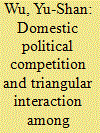

|
|
|
| 2 |
ID:
173978
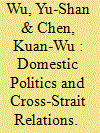

|
|
|
|
|
| Summary/Abstract |
This study examines the association between political competition (elections in Taiwan and political successions in China) and cross-Strait conflicts. We find that the Taiwan president has been more assertive toward mainland China during the election period or in his second term, than during the inter-electoral period or in the first term. The general secretary of the Chinese Communist Party (CCP) reacts to Taiwan’s provocations more harshly when he was in a period of power transition than when he had consolidated power. The two phenomena rest on the same assumption: when a political leader is domestically challenged, he cannot appear weak in external behaviors; when the leader is secure in his position, he can afford to make external concessions. We test the assumption against the empirical evidence from the cross-Strait relations of 1989–2012 and find the most serious conflicts occurred during Taiwan’s electoral period and when the CCP general secretary was in power transition. The study advances our understanding of how conflicts occur in cross-Strait relations and may lead to possible ways of their prevention.
|
|
|
|
|
|
|
|
|
|
|
|
|
|
|
|
| 3 |
ID:
066883
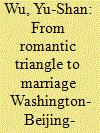

|
|
|
| 4 |
ID:
107030
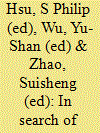

|
|
|
|
|
| Publication |
London, Routledge, 2011.
|
| Description |
xvi, 252p.
|
| Series |
Routledge contemporary China series
|
| Standard Number |
9780415587488, hbk
|
|
|
|
|
|
|
|
|
|
|
|
Copies: C:1/I:0,R:0,Q:0
Circulation
| Accession# | Call# | Current Location | Status | Policy | Location |
| 056186 | 338.951/HSU 056186 | Main | On Shelf | General | |
|
|
|
|
| 5 |
ID:
184425
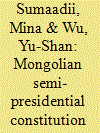

|
|
|
|
|
| Summary/Abstract |
While earlier studies of Mongolian democracy focused on actor-based explanations for its success, this study discusses the previously less examined role of Mongolia’s semi-presidential constitution in the process of democratization. It examines how the semi-presidential political system in Mongolia evolved since 1992 and offers an in-depth examination of the Mongolian semi-presidential form of government institutionalized by the 1992 constitution and its subsequent amendments. Based on this, it also addresses the question of whether the Mongolian semi-presidential constitution was a weakness or a strength to democratization. This study argues that at an early stage when the political forces were learning the rules of the game, the constitution was an overall positive influence on democratization. Moreover, the main weaknesses linked to the constitutional design were more likely to be related to weak institutional control mechanisms that could be resolved at a lower level legal framework.
|
|
|
|
|
|
|
|
|
|
|
|
|
|
|
|
| 6 |
ID:
112514
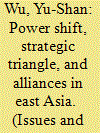

|
|
|
|
|
| Publication |
2011.
|
| Summary/Abstract |
This paper complements the traditional realist perspective (TP) with the strategic triangle theory (ST) in analyzing alliance formation and shift in East Asia. Alliance is perceived as a marriage triangle, and is subject to the dynamics of strategic actions taken by players to elevate their roles in the game. During the Cold War; two hierarchically structured alliance systems opposed each other in East Asia. Power shift in the continental system disrupted the Sino-Soviet pact, while hegemonic stability; in the maritime system buttressed the U.S.-led alliance. The division in the con-tinental system offered Washington opportunities to befriend Beijing and buttress its position in the U.S-Soviet-PRC strategic triangle. Washing-ton's allies were prompted to act likewise. The tension in competitive rapprochement was absorbed by the hegemonic structure of the maritime system. The, result was collective hedging (balancing-cum-engagement). In the post-Cold War era, the predominance of the United States caused the revival of the Beijing-Moscow nexus, now constructed as an equal partnership. Again one finds the continental and the maritime systems facing each other. Cross-system hedging is inevitable as this would increase the payoff of strategic players. Russia and Taiwan are examined in the above context, combining the perspectives of both TP and ST. The rise of China is expected to cause tension in the continental system. As predicted by the internal security dilemma. The rise of China also impacts on the maritime system by both increasing the tendency to balance it (as predicted by TP), and to improve relations with it (as predic1ed by ST), hence prompting hedging. However hedging is difficult for Taiwan, for it is only loosely connected to the maritime alliance..
|
|
|
|
|
|
|
|
|
|
|
|
|
|
|
|
| 7 |
ID:
138153
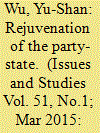

|
|
|
|
|
| Summary/Abstract |
It is widely recognized that the political system in the PRC is more institutionalized and predictable than in the past, and that its regular rejuvenation is a source of strength. While not denying the virtues of the age-based system, this paper argues that there are limits on the forced rejuvenation scheme. It looks at how cadres on the CCP’s Central Committee are excluded from competing for the top leadership positions because of their age. Four groups of elite are identified, T2 (zongshuji, zongli), SCP-T2 (changwei), PB-SCP (juwei), and CC-PB (zhongwei), and their frustration over exclusion from competing for the T2 positions in the next major leadership turnover (next even-numbered Party Congress) measured (Exclusion and Frustration Rate, EFR). An overall score is also calculated to measure the total frustration with the system (Total Exclusion and Frustration, TEF). It is shown that the EFR and TEF are extremely high, and tension is bound to accumulate in the system. Finally, the Bo Xilai (薄熙來) case is explored to demonstrate how aspiring cadres may be discriminated against by the system and thus inclined to rebel against it. It is advised that instead of simply accepting the system as it stands and calculating how personnel decisions will be churned out, more attention should be given to its limits and sustainability in the long term.
|
|
|
|
|
|
|
|
|
|
|
|
|
|
|
|
| 8 |
ID:
103628
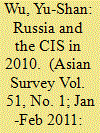

|
|
|
|
|
| Publication |
2011.
|
| Summary/Abstract |
Russia's semi-democratic system and fuel-driven state capitalism gradually recovered from the financial crisis. The Putin-Medvedev diarchy functioned reasonably well, although the two have not worked out a plan for political succession in 2012. On external relations, Russia improved ties with the U.S., and Kyrgyzstan's April revolution appeared a blessing.
|
|
|
|
|
|
|
|
|
|
|
|
|
|
|
|
| 9 |
ID:
089272
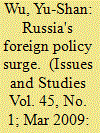

|
|
|
| 10 |
ID:
054191
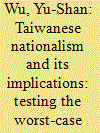

|
|
|
|
|
| Publication |
Jul-Aug 2004.
|
|
|
|
|
|
|
|
|
|
|
|
|
|
|
|
| 11 |
ID:
067001
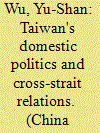

|
|
|
| 12 |
ID:
018236
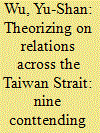

|
|
|
|
|
| Publication |
Nov 2000.
|
| Description |
407-428
|
| Summary/Abstract |
Cross-Strait relations between Taiwan and mainland China are of great importance to the development of China and peace in East Asia. However, this subject has not been sufficiently dealt with in a theoretical manner. This paper takes stock of the analytical approaches in the field in an effort to present to the academic world the existing intellectual instruments that interested researchers can take advantage of in cross-Strait studies. Nine approaches are identified. They are: the divided-nation model, integration theory, the power asymmetry model, the vote-maximizing model, the developmental state paradigm, strategic triangle theory, systems theory, political psychology theory, and the cognitive approach. The intellectual roots of these approaches are traced and their applicability to cross-Strait relations examined. Their strengths and weaknesses are also compared. Finally, a synthetic analytical framework is proposed. It is believed that a literature review of this kind is a prerequisite to a theoretical understanding of the cross-Strait relations.
|
|
|
|
|
|
|
|
|
|
|
|
|
|
|
|
|
|
|
|
|